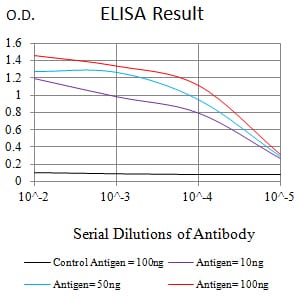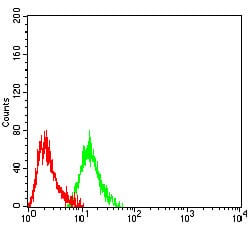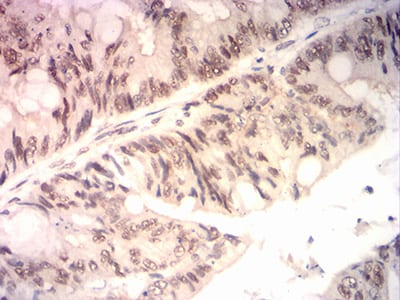



| WB | 咨询技术 | Human,Mouse,Rat |
| IF | 咨询技术 | Human,Mouse,Rat |
| IHC | 1/200 - 1/1000 | Human,Mouse,Rat |
| ICC | 技术咨询 | Human,Mouse,Rat |
| FCM | 1/200 - 1/400 | Human,Mouse,Rat |
| Elisa | 1/10000 | Human,Mouse,Rat |
| Aliases | OF; BACH1; FANCJ |
| Entrez GeneID | 83990 |
| clone | 4C6C8 |
| WB Predicted band size | 140.8kDa |
| Host/Isotype | Mouse IgG1 |
| Antibody Type | Primary antibody |
| Storage | Store at 4°C short term. Aliquot and store at -20°C long term. Avoid freeze/thaw cycles. |
| Species Reactivity | Human |
| Immunogen | Purified recombinant fragment of human BRIP1 (AA: 904-986) expressed in E. Coli. |
| Formulation | Purified antibody in PBS with 0.05% sodium azide |
+ +
以下是关于BRIP1抗体的3篇代表性文献(示例格式,建议核实原文):
1. **文献名称**:*BRIP1. a novel BRCA1-interacting protein essential for DNA repair*
**作者**:Litman R, et al.
**摘要**:该研究首次报道BRIP1(BRCA1相互作用蛋白)在DNA损伤修复中的作用,通过抗体检测发现其与BRCA1在细胞核内共定位,并参与同源重组修复机制。
2. **文献名称**:*Biallelic mutations in BRCA1/BRIP1 predispose to early-onset breast cancer*
**作者**:Cantor SB, et al.
**摘要**:利用BRIP1抗体进行免疫印迹分析,发现BRIP1双等位基因突变导致蛋白表达缺失,与家族性乳腺癌风险增加相关,提示其作为肿瘤抑制因子的功能。
3. **文献名称**:*BRIP1 deficiency impairs ovarian development and fertility in mice*
**作者**:Shakya R, et al.
**摘要**:通过免疫组化(使用BRIP1抗体)揭示BRIP1敲除小鼠的卵巢发育异常,表明其在生殖细胞DNA修复和卵巢功能维持中的关键作用。
*注:以上为模拟示例,具体文献请通过PubMed或Google Scholar以“BRIP1 antibody”及“BRIP1 function”等关键词检索核实。*
The BRIP1 antibody is a crucial tool in studying the BRCA1-interacting protein C-terminal helicase 1 (BRIP1), also known as BACH1 or FANCJ. BRIP1 is a DNA helicase involved in DNA repair mechanisms, particularly homologous recombination repair (HRR), which maintains genomic stability. It interacts directly with BRCA1. forming a complex critical for resolving DNA crosslinks and double-strand breaks. Germline mutations in BRIP1 are linked to hereditary breast and ovarian cancers, as well as Fanconi anemia (complementation group J), underscoring its role in tumor suppression.
BRIP1 antibodies are widely used in research to detect protein expression, localization, and function in cellular contexts. They enable investigations into BRIP1’s involvement in DNA damage response pathways, cell cycle regulation, and its interplay with other DNA repair proteins like BRCA1. PALB2. and RAD51. Dysregulation of BRIP1 is associated with chemotherapy resistance and poor prognosis in cancers, making its detection relevant for therapeutic studies. These antibodies are employed in techniques such as Western blotting, immunohistochemistry (IHC), and immunofluorescence (IF) to analyze tissue samples, cell lines, or preclinical models. Understanding BRIP1’s molecular dynamics through antibody-based assays contributes to advancing precision oncology and identifying biomarkers for cancer risk assessment or treatment stratification.
×